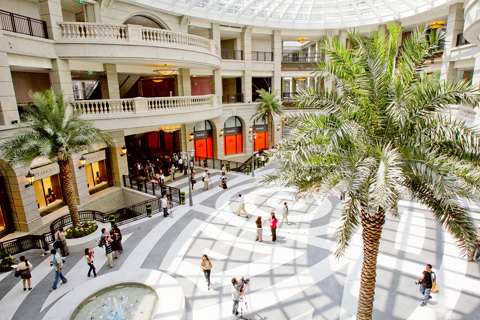The brand new shopping mall Bellavita held a soft opening yesterday to warm up for a heated retail war in Taipei City’s Xinyi District (信義) next month.
With 6,316 ping (20,879m²) of floor space on a 2,260-ping plot of land, Bellvita houses nearly 20 international luxury brands including Bulgari, Hermes, Tod’s and others.
S. H. Leung (梁秀卿), chairwoman of Bellavita, said before a ribbon-cutting ceremony that it had been her longstanding dream to run a “European-style” mall in Taiwan and that she was glad the dream had finally come true.

PHOTO: WANG WEN-LIN, TAIPEI TIMES
“It took five years to build Bellavita,” said Leung, wife of Quanta Computer Inc’s (廣達電腦) vice chairman and president C.C. Leung (梁次震). “Bellavita, which means beautiful life, will make shopping a relaxing and pleasant experience.”
Quanta chairman Barry Lam (林百里) was also present at the ceremony.
He did not make any comments on the mall or his firm, the world’s largest contract notebook computer maker.
An European-style building located on Songren Road, Bellavita will compete with the Taipei 101 Shopping Mall, Shin Kong Mitsukoshi Xinyi Department Stores (信義新光三越) and the New York New York Shopping Center (紐約紐約) for customers in the district.
Bellavita will gradually open its remaining floors over the next month.
The mall will also house restaurants with Michelin Guide stars, operators said.

Sweeping policy changes under US Secretary of Health and Human Services Robert F. Kennedy Jr are having a chilling effect on vaccine makers as anti-vaccine rhetoric has turned into concrete changes in inoculation schedules and recommendations, investors and executives said. The administration of US President Donald Trump has in the past year upended vaccine recommendations, with the country last month ending its longstanding guidance that all children receive inoculations against flu, hepatitis A and other diseases. The unprecedented changes have led to diminished vaccine usage, hurt the investment case for some biotechs, and created a drag that would likely dent revenues and

Global semiconductor stocks advanced yesterday, as comments by Nvidia Corp chief executive officer Jensen Huang (黃仁勳) at Davos, Switzerland, helped reinforce investor enthusiasm for artificial intelligence (AI). Samsung Electronics Co gained as much as 5 percent to an all-time high, helping drive South Korea’s benchmark KOSPI above 5,000 for the first time. That came after the Philadelphia Semiconductor Index rose more than 3 percent to a fresh record on Wednesday, with a boost from Nvidia. The gains came amid broad risk-on trade after US President Donald Trump withdrew his threat of tariffs on some European nations over backing for Greenland. Huang further

CULPRITS: Factors that affected the slip included falling global crude oil prices, wait-and-see consumer attitudes due to US tariffs and a different Lunar New Year holiday schedule Taiwan’s retail sales ended a nine-year growth streak last year, slipping 0.2 percent from a year earlier as uncertainty over US tariff policies affected demand for durable goods, data released on Friday by the Ministry of Economic Affairs showed. Last year’s retail sales totaled NT$4.84 trillion (US$153.27 billion), down about NT$9.5 billion, or 0.2 percent, from 2024. Despite the decline, the figure was still the second-highest annual sales total on record. Ministry statistics department deputy head Chen Yu-fang (陳玉芳) said sales of cars, motorcycles and related products, which accounted for 17.4 percent of total retail rales last year, fell NT$68.1 billion, or

MediaTek Inc (聯發科) shares yesterday notched their best two-day rally on record, as investors flock to the Taiwanese chip designer on excitement over its tie-up with Google. The Taipei-listed stock jumped 8.59 percent, capping a two-session surge of 19 percent and closing at a fresh all-time high of NT$1,770. That extended a two-month rally on growing awareness of MediaTek’s work on Google’s tensor processing units (TPUs), which are chips used in artificial intelligence (AI) applications. It also highlights how fund managers faced with single-stock limits on their holding of market titan Taiwan Semiconductor Manufacturing Co (TSMC, 台積電) are diversifying into other AI-related firms.